Subject Leadership, Organisation and Management
Useful articles in 'Primary History'
|
Each section of this unit begins by highlighting articles based on the current National Curriculum, and is followed by earlier pieces that are still worth reading. Please note that while the core advice is still relevant, articles from editions published prior to Primary History 66 will be based on the old National Curriculum. |
1. General responsibilities
2. Planning including curriculum planning
3. Progression including adaptive teaching and most able/high attainers and SEND
4. Assessment
5. Raising the profile of history
6. Teaching and learning strategies
7. Effective practice / Quality Mark
1. General Responsibilities
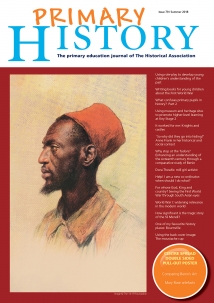
- Helen Crawford, Ailsa Fidler and Sue Temple, ‘Even more support for beginning teachers from the Historical Association’, PH 98, autumn 2024
- Tim Lomas, ‘Is primary history thriving? What the recent survey of primary history seems to be telling us?’ PH 94, summer 2023
- Ailsa Fiddler and Clare Stow, ‘Mentoring student teachers’ PH 91, summer 2022.
- Tim Lomas, ‘Research review series: July 2021: Summary of main points’ PH 89, autumn 2021.
- Kerry Somers and Phil Thomas, ‘Key Stage 2 – Key Stage 3: Transition. Preparing our primary historians for a successful future in history’, PH 89, autumn 2021.
- Tim Jenner, ‘Ofsted and primary History’ PH 87, Spring 2021
- Tim Lomas, ‘Help! I am a new co-ordinator: when should I do what?’ PH 79, summer 2018.
- Tim Lomas, ‘The co-ordinator's role and the 2014 national curriculum for history’ (Co-ordinators dilemma) PH 66, spring 2014. Lists some priorities.
- Michael Maddison, ‘The National Curriculum for History from September 2014: the view from Ofsted’ PH 66, spring 2014.
Also:
- Tim Lomas, ‘Co-ordinator concerns – planning visits’ in PH 61, summer 2012
- Tim Lomas, ‘Leading the subject in uncertain times’ (Co-ordinators dilemma), in PH 50, autumn 2008.
- Tim Lomas, ‘Co-ordinating in Key Stage 1’ (Co-ordinators dilemma) in PH 45, spring 2007. Includes key ideas, questions and tasks.
- Tim Lomas, ‘The role of the co-ordinator’ (Co-ordinators dilemma), in PH 44, autumn 2006.
- Tim Lomas, ‘Effective use of resources’ (co-ordinators dilemma), in PH 36, spring 2004.
- ‘Things to remember when planning History – one Subject Leader’s list’, PH 25 special edition: effective practice in the primary history curriculum 2000. Although aimed at the 2000 NC orders much is still relevant.
- ‘Effective Management of History in the Revised Curriculum’, PH 25 special edition: effective practice in the primary history curriculum 2000. Although aimed at the 2000 NC orders much is still relevant. Includes assessment, evaluation and target setting.
- Tim Lomas, ‘Planning for History in a Changing National Curriculum’, in PH 19, April 1998. Many of the principles still apply..
2. Planning including Curriculum Planning
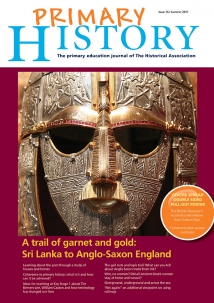
- Jo Pearson, ‘Planning for progression and sequencing in primary history’, PH 98, autumn 2024
- Tim Lomas, ‘Coherence in primary history: how can we get children to see that their history links up?’ PH 91, summer 2022.
- Yinka Olusoga, ‘Playing in the pandemic: Introducing the Play Observatory’ PH 90, spring 2022. Research project on children’s play during the pandemic.
- Kerry Somers, ‘History teaching and learning when you can't have the children in the classroom’ PH 88, summer 2021
- Matthew Flynn, ‘Life in lockdown’ PH 88, summer 2021
- Kate Rigby, ‘Supporting colleagues to develop their subject knowledge – the role of the subject leader’ PH 88, summer 2021
- Tim Lomas, ‘Back to Basics: How might we organise historical knowledge? Are knowledge organisers the way forward in primary history?’ PH 88, summer 2021
- Susie Townsend, ‘Back to basics: what does a good history lesson look like?’ PH 86, Autumn 2020.
- Tim Lomas, ‘Coherence in primary history: what is it and how can it be achieved?’ PH 76, summer 2017
- Michael Maddison, ‘Primary history and fundamental British values’ PH 73, summer 2016
- Ian Dawson, ‘Enquiry: developing puzzling, enjoyable, effective historical investigations’ PH 70, summer 2015.
- Hilary Pegum and Steve Davy, ‘Curriculum Planning: how to write a new scheme of work for history’ PH 66, spring 2014. Includes case studies and examples.
Also:
- Jon Nichol, ‘Principles for creating a 21st century history curriculum’ PH 64, summer 2013
- Linsey Maginn, ‘Creative approaches to thematic or topic based whole school curriculum planning’ PH 63, spring 2013.
- Tim Lomas, ‘Ofsted, primary history and creativity. Planning for co-ordinators’ (Co-ordinator concerns) PH 63, spring 2013.
- Nuffield Primary History Project, ‘Powerful Pedagogy: Teaching Principles for Doing History with Children’ PH 57, spring 2011.
- Rick Weights, ‘History and the Curriculum: Whole School Planning’ PH 57, spring 2011.
- Cathie McIlroy, ‘Planning for History: The Co-ordinators Perspective’ PH 57, spring 2011.
- Jane Shuter and Anita Loughrey, ‘Choosing a Topic: Creating Teaching Approaches and Choosing Resources for Historical Understanding’, PH 53, autumn 2009.
- Barbara Sands, ‘Using history to launch the Creative Curriculum’ PH 53, autumn 2009.
- Sarah Taylor and Hilary Pegum, ‘The Creative History Curriculum’ PH 50, autumn 2008.
- Tim Lomas, ‘Planning to get the best out of visual literacy’ (Co-ordinators dilemma), in PH 49, summer 2008.
- Tim Lomas, ‘Drama, creativity, literacy and curriculum planning’ (Co-ordinators dilemma), PH 48, spring 2008.
- Tim Lomas, ‘Balancing citizenship and history’ (Co-ordinators dilemma) in PH 46, summer 2007.
- Tim Lomas, ‘Creativity, Imagination and Fun in Primary History’, PH 38, winter 2004.
- ‘Some Teaching and Learning Strategies’. PH 25 special edition: effective practice in the primary history curriculum 2000. Although aimed at the 2000 NC orders much is still relevant. Covers local history, ICT, drama and role play.
3. Progression including adaptive teaching and most able/high attainers and SEND
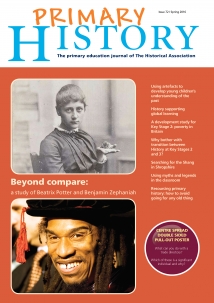
- Jo Pearson, ‘Planning for progression and sequencing in primary history’, PH 98, autumn 2024
- Linda Cooper, ‘Smooth transitions’ PH 85, Summer 2020
- Andrew Wrenn, ‘Why bother with transition between history at Key Stages 2 and 3?’ PH 72, spring 2016
- Hilary Pegum and Nicola Davies, ‘Whole school planning for progression: how do we do the best for our children and for history?’ PH 71, autumn 2015.
Also:
- Jerome Freeman, ‘Progression and Coherence in History: How to plan across the key stages’ PH 57, spring 2011
- Jenny Brookes and Jane Hack, ‘Case Study 3: Gifted Pupils design new Children’s Museum Galleries’, PH 47, summer 2007.
- Tim Lomas, ‘Catering for the gifted and talented in history’ (Co-ordinators dilemma), PH 47, autumn 2007.
- Cathy McIlroy, ‘Getting started: the identification of gifted historians’, PH 47, autumn 2007.
- Cathy McIlroy, ‘Case Study 2: The Body in the Bog: Red Christian goes Missing’ PH 47, summer 2007. Activities for gifted and talented. Linked to Nuffield Primary History.
- Andrew Wrenn, ‘Effective Primary History Teaching: Challenges and Opportunities Part 2’ PH 45, spring 2007. Findings based on kS2-KS3 transition project.
- Andrew Wrenn, ‘Effective Primary History Teaching: Challenges and Opportunities. Part 1’ PH 44, autumn 2006. Findings based on kS2-KS3 transition project. Part 1
- Tim Lomas, ‘Primary-Secondary continuity’ (co-ordinators dilemma), in PH 43, spring 2006.
- Karin Doull, ‘Challenge to higher attainers’ (Co-ordinator’s dilemma), PH 33, winter 2002.
- ‘Progression in History and Adapting Work to the Needs of Different Children’. PH 25 special edition: effective practice in the primary history curriculum 2000. Although aimed at the 2000 NC orders much is still relevant..
4. Assessment
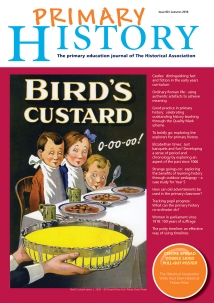
- Tim Lomas, ‘Subject leader’s site: assessment and feedback’ PH 87, Spring 2021
- Sarah Winter, ‘It worked for me: investing in dialogue as a tool for assessment’ PH 81, spring 2019
- Alun Morgan, ‘Assessment and feedback in history’ PH 81, spring 2019
- Tim Lomas, ‘Tracking pupil progress: what can the primary history co-ordinator do?’ PH 80, autumn 2018
- Jerome Freeman, ‘Assessment and Progression without levels: where do we go from here?’ PH 69, spring 2015.
Also:
- Tim Lomas, ‘Monitoring, Recording, Assessment and Reporting’ PH 57 spring 2011
- Hilary Cooper, ‘Thinking through History: Assessment and Learning for the Gifted Young Historian’, PH 47, autumn 2007.
- Tim Lomas, ‘Assessment for Learning’ (Co-ordinators dilemma), in PH 40, summer 2005.
5. Raising the profile of history (QM, clubs etc)
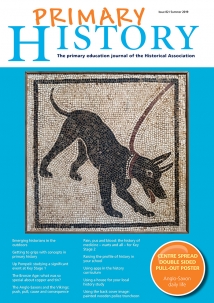
- Kelly Bridle, ‘The role of oracy in primary history: improving understanding of links across historical time’, PH 98, autumn 2024
- Rachael Gorczyca, ‘Building History connections with the local community: How one Quality Mark school showed that ambition reaps rewards’, PH 98, autumn 2024
- Kate Turner, ‘Balderstone St Leonard’s CE Primary School: Our journey to the Quality Mark Gold Award’, PH 97, summer 2024.
- Yinka Olusoga, ‘Playing in the pandemic: Introducing the Play Observatory’ PH 90, spring 2022. Research project on children’s play during the pandemic.
- Dimi Gospodinova, ‘How a history club can work for you and your pupils?’ PH 86, autumn 2020
- Karin Doull, ‘Extending the curriculum: why should we consider value added’ PH 84, spring 2020. Making the most of history in the school.
- Lisa Bell, ‘Becoming a Historical Association Teacher Fellow’ PH 83, autumn 2019.
- Kerry Somers and Sarah Bartlett, ‘Raising the profile of history in your school’ PH 82, summer 2019
- Bev Forrest and Mel Jones, ‘Good practice in primary history: celebrating outstanding history teaching through the Quality Mark scheme’ PH 80, autumn 2018.
Also:
- Lee Partridge, ‘The history club’ PH 63, spring 2013
- Jacquie Dean, ‘Evidence based History Teaching. Teacher as Researcher’ PH 57, spring 2011.
- David Field, ‘The Battle of Britain’, PH 23, October 1999; Using a history club.
6. Teaching and Learning Strategies
- Lindsey Rawes, ‘Active learners: classroom strategies for enhancing history teaching’ PH 97, summer 2024.
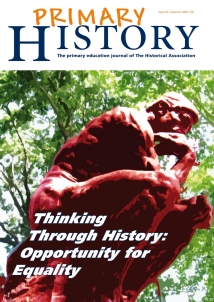
Mantle of the Expert
Also:
- Luke Abbot, ‘The Dramas of History’ PH 48, spring 2008. The role of the Mantle of the Expert.
Pupils as Detectives/Apprentice Historians
Also:
- Jon Nichol, ‘History Mysteries and Pupils as historical detectives’ in PH 62, autumn 2012
- Jacquie Dean and Jon Nichol, ‘Doing History: Pupils as Apprentice Historians (1) History Detectives’ PH 57, spring 2011.
- Peter Vass, ‘Doing History: Pupils as Apprentice Historians 2’ PH 57, spring 2011..
Pupil Voice
Also:
- Kelly Bridle, ‘The role of oracy in primary history: improving understanding of links across historical time’, PH 98, autumn 2024.
- Jacqui Dean, ‘Teaching Styles and Pupil Learning: The Nuffield Primary History Project’s Creative, Interactive Pedagogy – The Pupils’ Voice’, PH 47, autumn 2007.
School events, pageants and commemoration:
- Susie Townsend, ‘Musings and misconceptions about Remembrance Day’, PH 98, autumn 2024
- Stuart Boydell, ‘Significant anniversaries: The Bristol Bus Boycott, 1963’, PH 95, autumn 2023
- Karin Doull, ‘The Coronation’, PH 93, spring 2023
Tim Lomas, ‘Significant anniversaries: The infamous Beeching Report 1963’, PH 93, spring 2023 - Damienne Clarke, ‘Significant anniversaries in 2022: 50th anniversary of the UK’s first official Pride march: 1 July 2022’, PH 90, spring 2022
- Karin Doull, ‘The Queen in Procession’, PH 90, spring 2022.
- Kate Rigby, ‘Happy and Glorious: exploring and celebrating the Platinum Jubilee’ PH 90, spring 2022.
- Helen Crawford, ‘Ten texts for the Platinum Jubilee’ PH, 90, spring 2022.
- Paul Bracey, ‘Anniversary: Festival of Britain 1951 – a tonic for the nation’ PH 88, summer 2021
- ‘How can we use significant anniversaries such as the Representation of the People Act 1918 in our teaching?’ PH 78, spring 2018.
Also:
- Barbara Sands, ‘Planning a Victorian School Day’, PH 38, winter 2004.
Ideas for Assemblies
- Damienne Clarke, ‘Significant anniversaries in 2022: 50th anniversary of the UK’s first official Pride march: 1 July 2022’, PH 90, spring 2022
- Stuart Tiffany, ‘A slightly different view of remembrance’ (Ideas for Assembly) PH 80, autumn 2018
- Stuart Tiffany, ‘Women in parliament’ Ideas for Assembly’ PH 77, autumn 2017
- Caroline Bunce, ‘M&S brings over 130 years of archives into YOUR classroom’ PH 77, autumn 2017.
- Ilona Aronovsky, ‘Refugee stories’ Ideas for Assembly. PH 76, summer 2017.
- Ilona Aronovsky, ‘The life stories of refugees: Judith Kerr’ Ideas for Assembly. PH 75, spring 2017.
- Bev Forrest, ‘Did they die in vain? Empowering pupils to understand the First World War’ Ideas for Assembly PH 74, autumn 2016.
- Sue Temple and Jules Wooding, ‘Battle of the Somme’ Ideas for Assembly PH 73, summer 2016
- Bev Forrest and Stuart Tiffany, ‘Pietri Dorando and the 1908 Marathon’ Ideas for Assembly. PH 72, spring 2016
- ‘Soap Rationing – 9 February 1942’ Ideas for Assembly. PH 71, autumn 2015.
- Bev Forrest and Stuart Tiffany, ‘Remembrance’ Ideas for Assembly. PH 70, summer 2015
- Bev Forrest and Stuart Tiffany, ‘The contribution of the Commonwealth/Empire to the war effort’ Ideas for Assembly PH 69, spring 2015
- Bev Forrest and Stuart Tiffany, ‘The Christmas Truce: Ideas for Assembly’ PH 68, summer 2014.
- Bev Forrest and Stuart Tiffany, ‘Amelia Earhart: Ideas for Assembly’ in PH 67, summer 2014.
Effective practice / Quality Mark
- Kate Turner, ‘Balderstone St Leonard’s CE Primary School: Our journey to the Quality Mark Gold Award’ PH 97, summer 2024.

